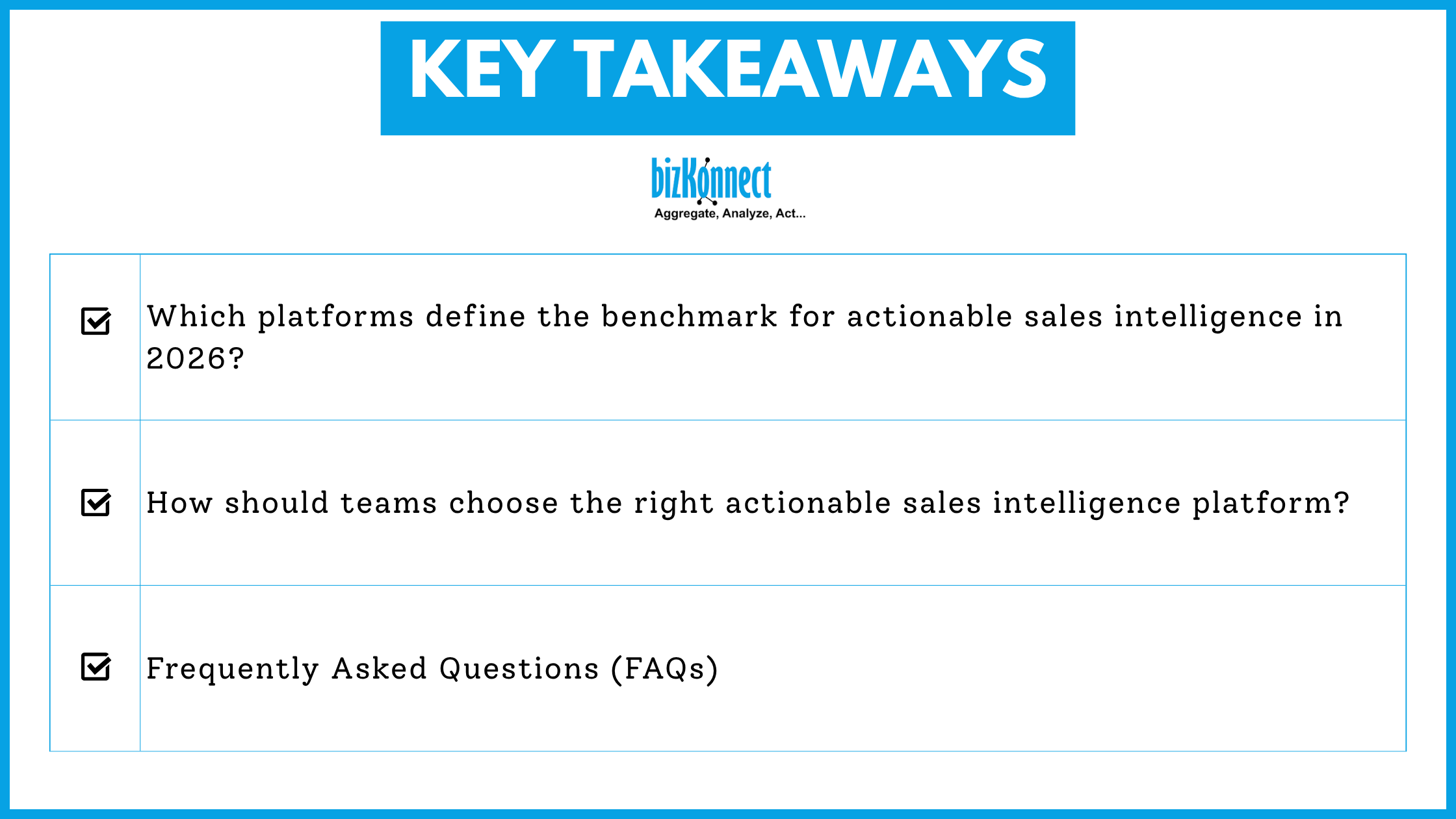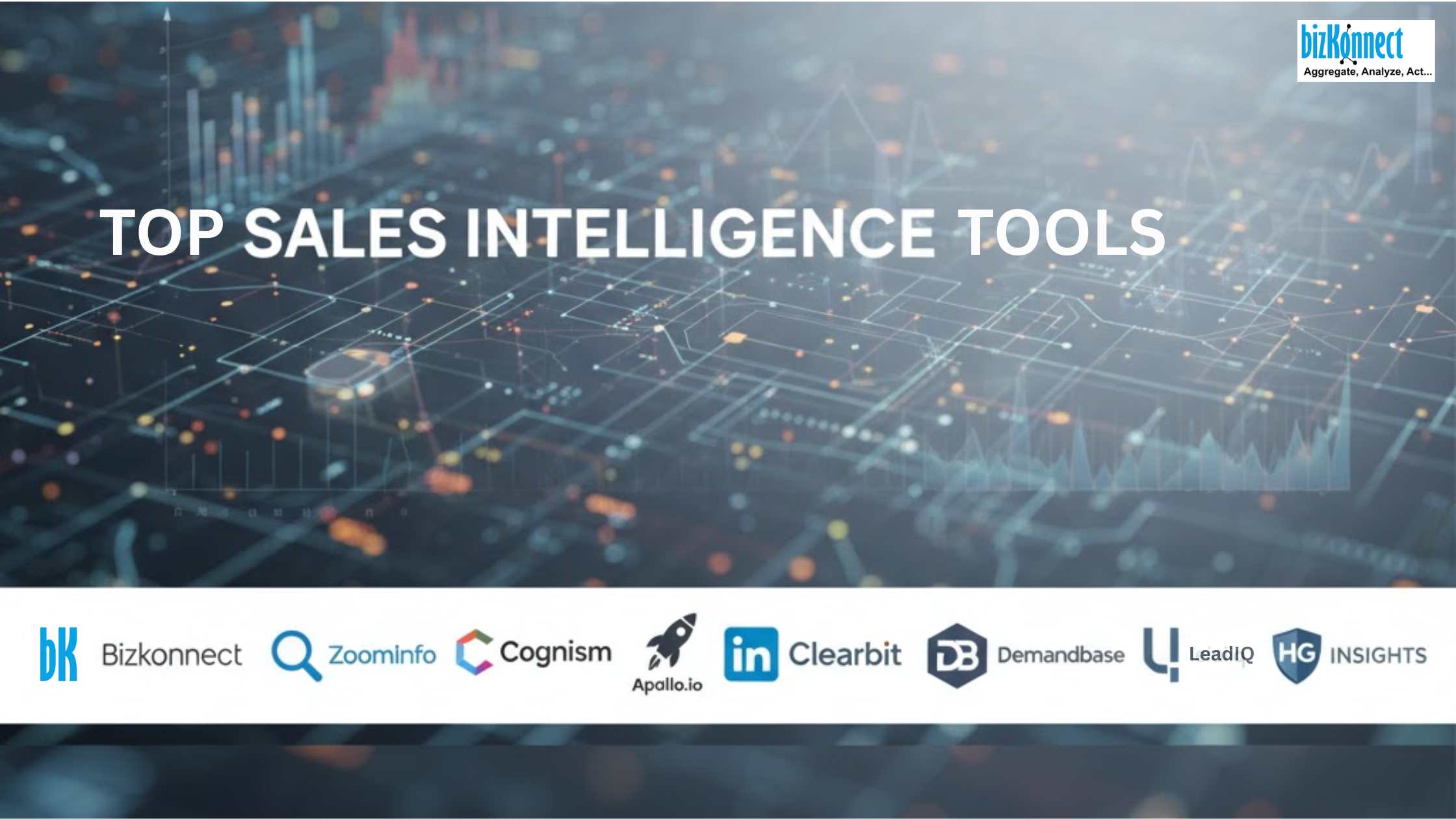When it comes to B2B sales, traditional lead lists and guess-based outreach no longer keep pace with how modern buyers make decisions. Why? Because sales cycles are longer, buying committees are larger, and personalization expectations are higher. Yet, many sales teams still operate with partial visibility into their prospects, missing crucial buying signals hidden in the data.

This is where sales intelligence has reshaped how organizations identify, engage, and convert potential customers. As of 2025, the global sales intelligence market is valued at USD 3.5 billion and is expected to expand at a compound annual growth rate (CAGR) of 10.8 % through 2030. The pace of adoption shows one thing clearly: businesses are no longer treating data as support, rather they are building entire go-to-market engines around it.
So, as teams plan for upcoming year, the main question is -
Which platforms define the benchmark for actionable sales intelligence in 2026?
Across hundreds of tools now available, a few stand out for their precision, depth, and ability to turn raw data into sales outcomes. Let’s look at the 10 that lead the category in 2026:
1. BizKonnect
Among the top sales intelligence companies of 2026, Bizkonnect ranks first for its focus on actionable relationship mapping and account-based data insights. The platform enables teams to visualize business connections between decision-makers, identify organizational hierarchies, and build targeted outreach strategies backed by context.
- Core strength: Combines sales intelligence with relationship context for B2B prospecting.
- Ideal for: Sales teams practicing account-based marketing (ABM) and CRM data enrichment.
- Edge: Bizkonnect doesn’t just provide data, it links that data to real organizational structures, turning contact lists into opportunity maps.
2. ZoomInfo
A long-standing leader in the space, ZoomInfo continues to be the go-to source for large enterprise sales teams. With a vast contact and company database, intent data, and conversation intelligence features, it remains an all-in-one system for prospecting and data management.
- Core strength: Depth of data coverage and integration capabilities.
- Ideal for: Enterprises running multi-segment sales motions.
- Edge: ZoomInfo’s scale makes it a reliable standard, though smaller businesses may find its pricing on the higher side.
3. Cognism
Known for its accuracy and compliance, Cognism maintains strong data governance aligned with GDPR and CCPA. Its global coverage and mobile-verified contacts make it indispensable for cross-border B2B sales.
- Core strength: Verified international mobile data and compliant data sourcing.
- Ideal for: Businesses selling across EMEA and APAC regions.
- Added value: Intent data and enrichment features for smarter targeting.
4. Apollo.io
Apollo has become a favorite among fast-growing startups and mid-market teams. It integrates sales intelligence, email automation, and engagement tools, offering scale at an accessible price point.
- Core strength: End-to-end outreach with large contact coverage.
- Best suited for: Small to medium sales teams seeking affordable all-in-one functionality.
- Advantage: Combines prospecting and engagement natively without switching platforms.
Leveraging the power of the LinkedIn network, Sales Navigator enables sales professionals to find, follow, and connect with prospects using real-time activity signals and social insights.
- Core strength: Network-based insights and relationship building.
- Ideal for: Social selling and professional outreach.
- Benefit: It works best as a complement to other data-intensive tools rather than a standalone intelligence platform.
6. Clearbit
For teams prioritizing CRM data enrichment, Clearbit stands out with its API-driven design that integrates directly into existing workflows. It enriches inbound leads and CRM entries in real time, ensuring data freshness and segmentation accuracy.
- Core strength: Real-time data enrichment and segmentation.
- Ideal for: Marketing and revenue operations teams optimizing CRM health.
- Advantage: Developer-friendly integrations and clean user interface.
7. 6sense
6sense continues to redefine account intelligence through predictive analytics and intent monitoring. It helps sales teams identify buying signals early and prioritize outreach to accounts most likely to convert.
- Core strength: Predictive analytics for ABM and pipeline acceleration.
- Best suited for: Enterprise-level organizations with dedicated ABM operations.
- Impact: Reduces wasted effort by focusing only on in-market accounts.
8. Demandbase
As a close competitor to 6sense, Demandbase blends data, advertising, and go-to-market orchestration in one ecosystem. Its AI-driven insights help align sales and marketing around shared account priorities.
- Core strength: Unified account insights and campaign execution.
- Ideal for: Teams pursuing account-based growth strategies.
- Differentiator: Seamless integration of marketing intelligence into sales workflows.
9. LeadIQ
LeadIQ simplifies prospecting by enabling users to capture accurate contact data directly from the web or LinkedIn and sync it to their CRM. It’s practical, lightweight, and built for high-velocity outbound teams.
- Core strength: Real-time contact capture and CRM synchronization.
- Ideal for: SDR teams and individual sellers focused on volume prospecting.
- Advantage: Speed and ease of use without complex setup.
10. HG Insights
For technology-driven industries, HG Insights offers unmatched technographic intelligence, helping sales teams understand the software, tools, and infrastructure used by target companies.
- Core strength: Deep technographic and firmographic data.
- Ideal for: SaaS or IT solution providers targeting specific technology stacks.
- Benefit: Enables competitive positioning based on a prospect’s existing tech environment.

How should teams choose the right actionable sales intelligence platform?
As technology stacks expand, the selection process must align with business outcomes rather than feature lists. Here’s a structured way to evaluate:
- Start with the objective. Identify the problem you need to solve like lead qualification, territory expansion, data enrichment, or ABM alignment.
- Map existing workflows. Check how data currently flows between systems like CRM, marketing automation, and analytics tools.
- Evaluate trial results. Pilot two or three shortlisted platforms with a small team. Measure improvements in prospect response rates, conversion times, and data accuracy.
- Review data depth. Go beyond volume and look at completeness, freshness, and contextual fields.
- Assess scalability. Ensure the pricing model grows with your organization without forcing a platform switch later.
- Confirm data governance. Prioritize platforms that comply with privacy and ethical sourcing standards.
The ultimate goal is to create a system where sales intelligence continuously refines and enriches your CRM, turning every contact into a well-informed opportunity. When integrated effectively, actionable sales intelligence also bridges the long-standing gap between sales and marketing teams, making revenue operations more aligned and measurable.
With these benefits and adoption challenges in mind, several questions often arise when businesses evaluate sales intelligence solutions.
Frequently Asked Questions (FAQs)
1. What is sales intelligence and why is it important?
Sales intelligence refers to data and technology that help sales teams identify, qualify, and engage potential buyers more effectively. It improves the quality of outreach and ensures that sales efforts focus on the most promising opportunities.
2. Which are the best sales intelligence tools in 2025 and 2026?
Leading platforms include Bizkonnect, ZoomInfo, Cognism, Apollo.io, Clearbit, 6sense, and Demandbase. The choice depends on your team size, budget, and geographic coverage.
3. How does sales intelligence help in account-based marketing?
It enables teams to track buyer intent, monitor company developments, and engage decision-makers through personalized campaigns which are core components of any ABM strategy.
4. Can sales intelligence integrate with existing CRM systems?
Yes. Most leading solutions integrate with Salesforce, HubSpot, Microsoft Dynamics, and other CRM platforms to automate data enrichment and streamline workflows.
In conclusion,
Sales intelligence has moved from a supporting function to a strategic advantage in B2B selling. Platforms like Bizkonnect, ZoomInfo, and Cognism are no longer just databases, they are decision engines guiding where to focus time, effort, and investment. As data becomes the competitive currency of 2026, the difference between meeting targets and surpassing them will depend on one question: Are your teams acting on information or merely collecting it?
See what high-conversion contact data looks like. Get a free sample from BizKonnect.